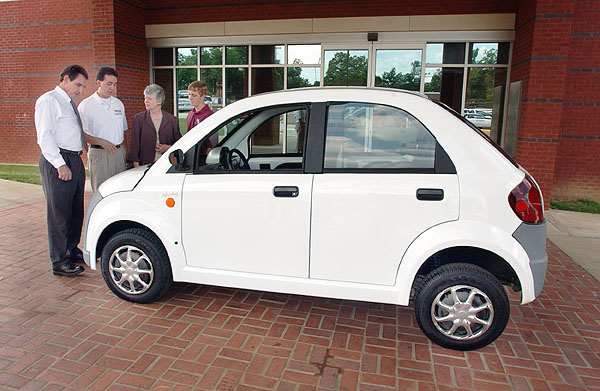Contact: Maridith Geuder

MSU rehabilitation engineer Andy Whetstone (second from left) inspects the prototype with Ed Butler (left) and Jane Taylor of the Mississippi Council on Developmental Disabilities and junior Jacob Davis, a mechanical engineering major who works at the Martin Center.
A prototype being developed by Mississippi State may become "the little car that could" for some folks whose disabilities won't allow them to drive a standard automobile.
The university's T.K. Martin Center for Technology and Disability recently took delivery of a commercially available electric vehicle that often is used in residential communities and industrial parks. Evaluations for adaptive driving and recommendations for appropriate operating technologies are among the varied services offered by the facility.
With funding from the Mississippi Council on Developmental Disabilities, the center is reconfiguring the vehicle, using advances in electronics, environmental sensing and telematics. The latter refers to systems used in automobiles that combine wireless communication and global positioning system (GPS) tracking.
Small, dome-shaped and powered by six 12-volt batteries, the four-seat prototype can be recharged through normal electrical outlets. "It's a low-speed, limited-range vehicle whose maximum speed is about 25 miles per hour," said the Martin Center's Andrew G. Whetstone.
The rehabilitation engineer said the MSU research team anticipates that elements of adaptive technologies being employed in the project have the potential to help individuals with developmental disabilities overcome some physical, cognitive, and sensory limitations.
Even with existing technologies for sedans, minivans and vans, some individuals are unable to drive cars with standard adaptations, he explained.
"We're looking at developing a rear-entry system to accommodate a single wheelchair user," Whetstone said. The vehicle will use drive-by-wire technology to control the gas and brake or the gas, brake and steering, he added.
Founded in 1996 and named for the former MSU vice president who led in making the campus more handicapped-accessible, the Martin Center provides research and clinical services for persons with all types of disabilities. In addition to rehabilitation and biomedical engineers, its staff also includes occupational therapists, speech-language pathologists and special educators.
"With this project," Whetstone said, "we're hoping to incorporate some of the 'smart' driving technology such as on-board navigation systems, intelligent cruise control, automatic parallel parking, and vehicle proximity detection systems."
He said a similar prototype tested in the United Kingdom during the 1970s demonstrated that battery-powered vehicles can operate safely on highways.
Testing of MSU's prototype is expected to begin next spring after alterations have been completed.
For more information on the project, visit the center Web site at http://www.tkmartin.msstate.edu/ or telephone Judy Duncan at (662) 325-1028.